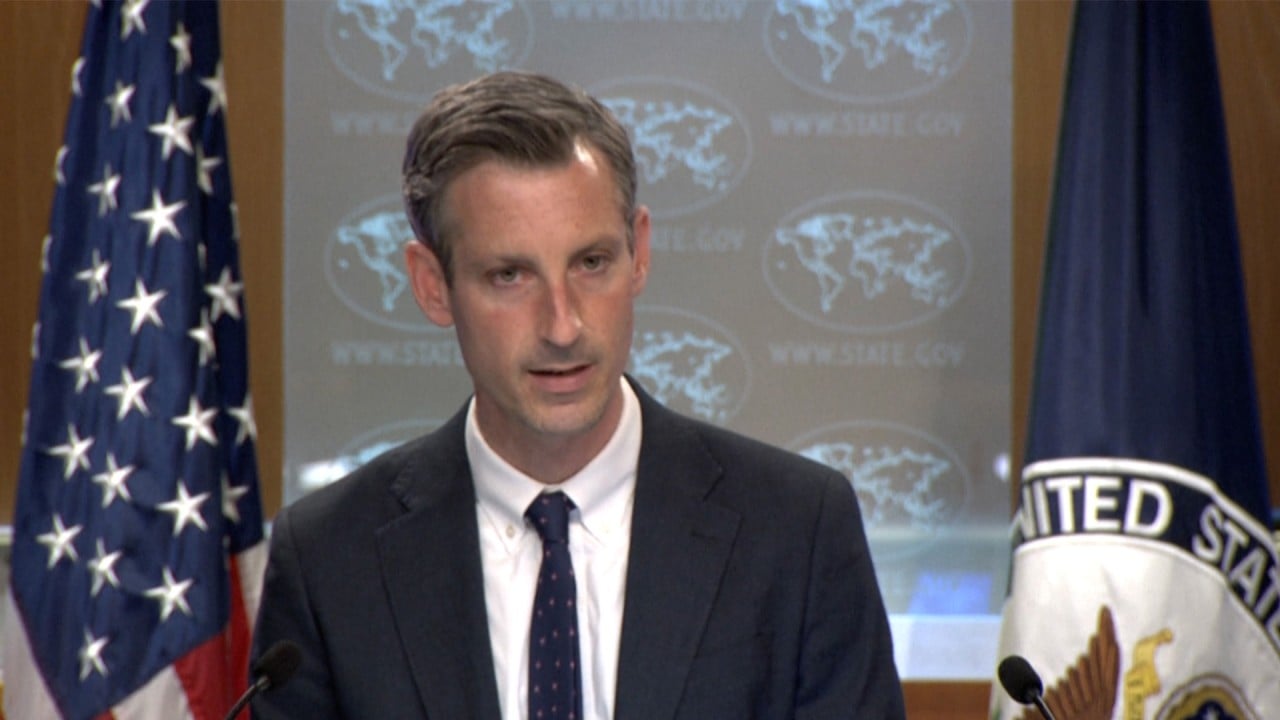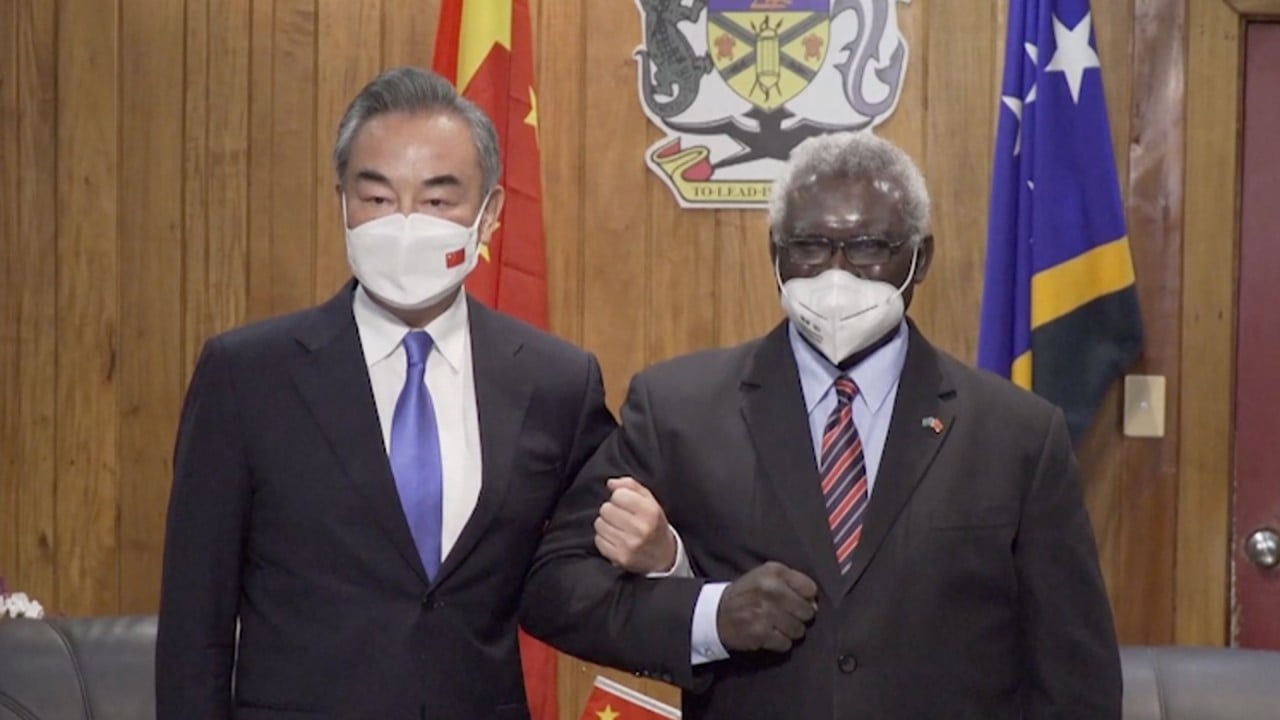
China-West rivalry hits the Pacific as Wang Yi comes calling with security deals
- US-led IPEF signs up Fiji, and Australia asserts no-strings support for Pacific nations, as jostling with China over closer ties with region picks up pace
- ‘Whoever controls these islands controls the Pacific Ocean’, China-based analyst notes
Fiji became the 14th nation overall to join the pact, with the White House declaration coming just as Chinese Foreign Minister Wang Yi touched down in the Solomon Islands – the first stop of a 10-day, eight-nation South Pacific tour aimed at expanding Chinese military, economic and diplomatic ties.
China eyeing security pacts with more Pacific nations: FT report
Addressing the Pacific Islands Forum Secretariat in the Fijian capital Suva, Wong pledged to work with neighbours in the region to tackle climate change, an issue she said had long been neglected by previous Australian governments.
“We are listening and we have heard you,” Wong said.

In veiled criticism of China’s attempts to increase its influence in the region, Wong reaffirmed Australia’s commitment to the Pacific, saying this came with no strings attached.
“Australia will be a partner that doesn’t come with strings attached – nor imposing unsustainable financial burdens,” said Wong, who flew in from Japan after joining Quad talks there alongside recently elected Australian Prime Minister Anthony Albanese.
“We are a partner that won’t erode Pacific priorities or Pacific institutions – we believe in transparency, we believe in true partnerships.”
Location, location, location
The South Pacific consists of 14 independent states and other dependencies administered by the US, France, Australia and New Zealand.
Tiny in terms of both size and population, these scattered islands in the southern hemisphere were long considered a geoeconomic backwater after the Cold War. However, they have come under the geopolitical spotlight in recent years, largely after a steady increase in China’s engagement with the region, according to Yu Lei, chief fellow of the Pacific Island countries research centre at Liaocheng University, in the eastern Chinese province of Shandong.
The Pacific Theatre of World War II was a crucial battleground between American and Japanese forces, starting with the attack on Pearl Harbour in Hawaii. This demonstrated the region’s military significance, particularly in maintaining logistical supply lines and for military power projection, Yu noted.
“Whoever controls these islands controls the Pacific Ocean,” Yu said. “This is why the West believes the Pacific Islands are important.”
Yu said this could also partly explain why the US and its allies were so concerned over China’s influence in the region, which controls access to Hawaii and the west coasts of the US and South America.
China hits back at Australia over Solomon Islands ‘red line’
“The West is worried that once China’s ties with the Pacific Islands are strong enough, when China asks to establish a military base in the region, these islands would say yes, and this would allow China to break through the so-called two island chains.”
Yu was referring to the geographical security concept crafted by the US in the 1940s – where the first island chain is the southern tip of Japan through the Philippines, and the second includes Japan, the Marianas and Guam – as defensive buffer zones to deter the maritime ambitions of both China and the former Soviet Union.

The view from Beijing
However, Reuters said leaked documents showed China was aiming for deals with at least 10 Pacific island countries on policing, cybersecurity, maritime surveillance, fishing rights and the setting up of a free trade area, apart from climate change and pandemic control.
Mihai Sora, project director for the Australia–PNG Network at the Sydney-based Lowy Institute, said China’s proposed security cooperation with Pacific countries had raised concerns among regional leaders about the destabilising effects of geopolitical competition.
Pacific nations don’t need West’s ‘lectures’ about China ties, Kevin Rudd says
According to Associated Press, President David Panuelo of Micronesia said he would not sign up to China’s “Common Development Vision”, raising strong concerns about challenges to Pacific sovereignty by the kind of security arrangements proposed, which he said would open the doors for Beijing to own and control the region’s fisheries and communications infrastructure.
A Kiribati official also told Reuters that the country was not keen on a security arrangement with China, and would only focus on mutual trade and tourism opportunities.
Sora said Beijing might seek “practical results” from Wang’s trip. “In seeking such a comprehensive regional agreement with Pacific countries, it is evident China seeks to change the regional order in the Pacific,” he noted.
Yu at Liaocheng University, however, argued that Beijing’s interests mostly focused on the economy and diplomacy.
Each of the 14 sovereign states in the South Pacific has a vote at international bodies such as the United Nations and the World Health Organization, Yu pointed out. This made the region unique, “especially when it comes to contentious issues [for Beijing] like Taiwan, Xinjiang and human rights”, he said.
Climate change and infrastructure
The picturesque Pacific Islands, which are largely economically depressed and heavily dependent on tourism, had suffered greatly from the Covid-19 pandemic and the resultant collapse of the travel industry, Yu added.
“So the island countries may ask for more Chinese investment to help revive their economy, for example, to pump some blood into the fishery and tourism sectors which are two major sources of revenue for the Pacific Islands,” he said.
Japan steps up Pacific engagement amid China-Solomons pact concerns
During Wang’s tour, Beijing may also seek to play up its support to fight climate change, widely considered to be a top threat to the Pacific Islands.
Yu said there was a real need to improve infrastructure, as most Pacific archipelagos were vulnerable to natural disasters.
“They may want China to build new roads and bridges, because climate change is not a problem that can be solved in a day or two. Still, people need to carry on with their lives, and without roads and bridges it would be very difficult,” he said. “So for the Pacific Islands, infrastructure construction is a very pressing issue, too.”



